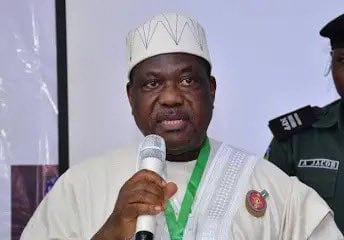The Federal Government on Wednesday attributed the recent surge in terror attacks—including the abduction of schoolgirls in Kebbi State and the deadly assault on worshippers in Eruku, Kwara State—to provocative statements made by the United States. Public anger over these incidents has intensified across the country.

Secretary to the Government of the Federation, George Akume, said posts by former US President Donald Trump, alleging a “Christian genocide” in Nigeria and threatening possible military intervention, had “inadvertently emboldened opportunistic violent groups” to target soft and vulnerable locations.
“Recent pronouncements from the United States have inadvertently encouraged violent groups to exploit international narratives and attack soft targets,” Akume said, emphasizing the need for constructive collaboration rather than public labelling.

According to Akume, prior to these remarks, insurgency structures had been significantly weakened and largely reduced to isolated banditry. He stressed that Nigeria does not require foreign troops, but targeted support in intelligence, technology, and military equipment is crucial to strengthen ongoing operations against extremists.
He also rejected claims framing the conflict as a “Christian genocide,” noting that attacks have targeted both churches and mosques, affecting Muslims and Christians alike. Nigeria, Akume affirmed, remains a secular state, with government appointments reflecting its religious diversity.

The attacks have drawn significant attention. In Kebbi State, bandits raided the Government Girls Comprehensive Secondary School in Maga, killing Vice Principal Hassan Makuku, who reportedly tried to protect the students, and abducting 24 schoolgirls. Two girls managed to escape unharmed.
In Kwara, gunmen attacked the Christ Apostolic Church in Eruku during a live-streamed service, killing at least two people and abducting approximately 35 worshippers. The incident left the community in shock, with local residents criticizing police inaction during the attack.

In response, President Bola Tinubu postponed his foreign trips to the G20 Summit in South Africa and the AU–EU Summit in Angola. He directed Vice President Kashim Shettima to visit Kebbi and assess the situation, while ordering the deployment of additional security personnel to Kwara’s Eruku area.
Governor Abdulrahman Abdulrazaq of Kwara has also called for the establishment of a Forward Operating Base and a Mobile Police Squadron in Eruku to enhance security. He criticized the local police for failing to prevent the attackers from escaping, while youth leaders demanded arms and support to defend the community.

Religious groups, including Jama’atu Nasril Islam (JNI), condemned the abductions and highlighted poor coordination among security agencies. JNI described the recurring school attacks as a threat to girl-child education and urged decisive government action.
Political figures, including former governors Rotimi Amaechi and Rabi’u Musa Kwankwaso, and civil society organizations such as the Nigeria Labour Congress, criticized the Federal Government’s handling of insecurity. They called for stronger military intelligence, urgent rescue operations, and tangible protection for citizens.

Prominent activists and celebrities, including Omoyele Sowore, Falz, Femi Adebayo, Debo Macaroni, and Simi, also condemned the attacks and demanded immediate government action. They highlighted the human cost of insecurity, stressing that children, families, and communities are being left vulnerable.
The Federal Government continues to urge citizens to cooperate with security agencies by sharing intelligence, emphasizing that the Nigerian Armed Forces are capable, professional, and committed to reclaiming territories and combating criminal networks.




